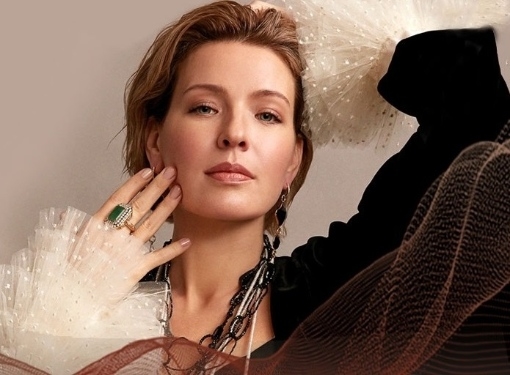The International Music Festival Moravian Autumn begins next Sunday and will open with Heinrich's work entitled Singing the Spirit of the Wild Forest or Glimpses of Yankee Doodle. Anthony Philip Heinrich's "American Beethoven" will be followed by works from Beethoven, Pärt and Scriabin - his Prometheus for light piano. Pianist Polina Osetinskaja will take the solo part, the Brno Philharmonic will be accompanied by the Slovak Philharmonic Choir with the evening being led by chief conductor Dennis Russell Davies.
Anthony Philip Heinrich was born in 1781 in Krásný Buk, but spent most of his life overseas, where he was present at the birth of American classical music. He became the first professional composer in America to make a living solely from music. He started composing without any formal compositional training. This happened during the year when he lived alone in a log cabin after a serious illness. He gained popularity and respect among his colleagues, who began calling him the American Beethoven. Incidentally, he was the first to conduct Beethoven in America, specifically his Symphony No.1 in C major. He was also the first to use Native American musical motifs in his compositions. He began composing programme music much earlier than European composers, drawing inspiration from the natural world, influenced by the 700-mile pilgrimage he made on foot after the death of his wife. “Anthony Philip Heinrich was a man with an extraordinary destiny whose music is beginning to make a comeback on the world stage. It is characterised by passion, ingenuity and difficulty. It hints at something that the European ear is not used to. It combines experience with European music and at the same time is unencumbered by its tradition," said Vítězslav Mikeš, the dramaturge of Moravian Autumn.
The International Music Festival begins next Sunday, October 1, 2023, and will open with Heinrich's poignantly atmospheric work, Singing the Spirit of the Wild Wood or Glimpses of Yankee Doodle. The symphony with a large cast and unusual instruments will be performed in its Czech premiere. The "American Beethoven" is followed by the real Beethoven, specifically his rarely performed Fantasy in C minor. This year's 52nd edition of the festival bears the motto Great works by forgotten composers, forgotten works by great composers - and these two works perfectly fit with the motto.
The second half of the gala evening will open with another Czech premiere: Credo by the Estonian composer Arvo Pärt, one of the world’s most famous contemporary composers. The polystylistic cantata reflects the discord between credo and retribution (the liturgical verse Credo in Jesum Christum versus, verses 38 and 39 of Matthew 5). Musically, it is expressed by the sheer beauty of the fragments of Bach's Prelude in C major from the well-tempered piano, which is juxtaposed with dodecaphonic passages and strictly structured aggressive clusters to bring the whole cantata to the reconciliatory sounds of credo, again in the Bachian vein. “It is an extraordinary work full of contrasts, I believe it will have a strong impact on the listener. After all, the whole evening is composed as an extraordinary event, an extraordinary whole made up of compositions that people will not hear anywhere else," said Marie Kučerová, director of the Brno Philharmonic.
The gala evening will end with Prometheus (Symphony No. 5 "Poem of Fire") by Alexander Scriabin. The Russian composer believed in the omnipotence of art, and under the influence of German idealist philosophy and religious mysticism, he came to self-deification: he saw himself as a messiah who, through his work, was to lead mankind out of its actual existence into an ideal existence. He put his philosophical ideas into a trio of symphonies: Divine Poem, Poem of Ecstasy and Prometheus (Poem of Fire). It is Scriabin's most harmonically explosive orchestral work, based on a six-tone series. “The solo piano is used as a harmonic percussion instrument, with the chorus joining in the final gradation without text. Scriabin's synaesthetic perception of music was reflected in the use of the so-called light piano, which follows a scheme in which the author assigned individual colours to specific tones," Mikeš emphasised. Cori O´Lan, Director of the renowned Austrian festival Ars Electronica, will take care of the lighting design in Brno. According to Scriabin's scheme, the individual notes acquire their colours and their intensity responds in real time to the dynamics of the orchestra.













No comment added yet..